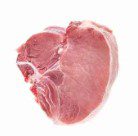

Pork chops can be a nutritious source of protein, vitamins, and minerals for dogs, but it is important to cook them thoroughly. If feeding raw pork chops, freezing them beforehand can reduce the risk of harmful bacteria.
Pork chops are a lean cut of meat that is high in protein and low in fat. They are packed with essential vitamins and minerals, including B vitamins, vitamin D, potassium, selenium, zinc, phosphorous, and iron. When sourced from reputable sources, raw pork can also be a safe option for dogs on a raw food diet.
Raw or undercooked pork chops can contain bacteria and parasites that can be dangerous for dogs. Trichinosis, caused by the roundworm Trichinella spiralis, can lead to vomiting, diarrhea, fever, muscle pain, and even death. It is also important to avoid feeding pork chops with bones, as they can splinter and cause digestive issues.
When purchasing pork chops, opt for pasture-raised options. Cooked pork chops can be served without seasonings, and the portion size should be appropriate for your dog’s size and dietary needs. For raw diets, it is crucial to source pork chops from reputable sources and freeze them for at least three weeks to reduce the risk of food-borne illness.
Pork chops, also known as pork steaks, are a source of protein, vitamins, and minerals for dogs. They are originated in Europe and commonly used in American and European cuisine. One benefit of pork chops is that they are a lean cut of meat, making them a good source of protein without too much fat. They provide essential nutrients such as B vitamins, vitamin D, potassium, selenium, zinc, phosphorous, and iron. However, raw pork chops can contain bacteria and parasites that can be harmful to dogs. It is important to purchase pork chops from reputable sources and cook them thoroughly if feeding them to your dog. Cooked pork chops can be served without seasonings, and portion sizes should be appropriate for your dog's size and dietary needs. Two alternative sources of protein for dogs are chicken or beef. Have you ever fed your dog pork chops? What was their experience? Remember to always consult with your veterinarian before feeding any new food to your pet.